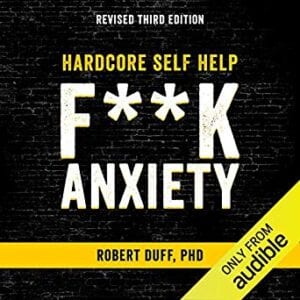
Beta-blockers are excellent medications in controlling fight-or-flight bodily responses in addition to minimizing its impact on the heart. This means that this class of medication helps in stress-related effects on the heart and body.
It might sound strange, but many people actually suffer from anxiety as a condition. Anxiety is a normal feeling used to prepare for potentially dangerous situations. While it is beneficial to have this feeling when it’s used in a positive way, it can also become a problem. If you’re one of the many people who experience anxiety, then you might know that it can be difficult to get through the day.
You may feel nervous, or you might have intense feelings of fear or panic. People who suffer from anxiety may feel these feelings without knowing why. Many people treat anxiety with drugs. However, many of these drugs can have serious side effects and can be habit-forming. Other people may try to avoid their triggers.
However, this can make the problem worse in the long term. That’s why natural anxiety treatments are so important. There are many non-drug methods that can help you manage your anxiety. Beta-blockers are also used for anxiety treatment. This is because anxiety is as a result of the fight-or-flight effects on the brain and body.
Beta-blockers even though very effective as anxiety treatment medication, pose a number of side effects. This means that you should always talk to anxiety treatment doctors about the medication before taking it.
Contents
What Is Beta-blocker?
A beta-blocker is a medication that blocks the effects of adrenaline and noradrenaline, which can help to reduce physical responses to anxiety. Beta-blockers are usually used in the treatment of heart conditions, such as high blood pressure or angina. However, they can also be prescribed for the treatment of various mental health disorders.
What medical conditions are treated with beta-blockers?
Beta-blockers have effects on fight-or-flight body response and the reduction of heart rate. The beta-blockers are effective therefore in heart-related conditions and other conditions. Thus, beta-blockers are effective in the following medical conditions:
- Hypertension or high blood pressure
- Congestive heart failure
- Heart attack or myocardial infarction
- Irregular heartbeat or atrial fibrillation
- Anxiety disorders
- Angina pectoris (Chest pain emanating from low blood supply to heart muscles)
- Migraine
- Some tremors
- Glaucoma
- Hyperthyroidism
It should be noted that primarily beta-blockers are medications for heart problems. For anxiety disorders, doctors prescribe beta-blockers on an ‘off-label’ basis.
How do beta-blockers work?
Beta-blockers are also known as beta-adrenergic blockers. This means that they work in the heart by preventing adrenaline from attaching to the heart’s beta receptors. Adrenaline (epinephrine) is known as the stress hormone.
Adrenaline is a neurotransmitter produced in the brain and adrenal glands which together with noradrenaline prepares the body for fight-or-flight actions in the body. After production, the two neurotransmitters are released into the blood as chemical mediators to send messages to all body systems.
Adrenaline fight-or-flight response includes the following actions that are seen during moments of stress and anxiety. It increases the heart rate, increases blood pressure, opens and widens the airways in the lungs, causes enlargement of the pupils in the eyes, increases blood flow to muscles, and changes in metabolism.
Some beta-blockers also relax your blood vessels in addition to preventing the attachment not of adrenaline to the heart’s beta receptors. Relaxation of arteries and veins in the body function to reduce blood pressure. All the other actions of adrenaline discussed above are also affected by beta-blockers.
Because of the level of action of beta-blockers, they are classified as selective and non-selective beta-blockers. Selective beta-blockers affect the heart majorly while non-selective beta-blockers affect other parts of the body.
Examples of beta-blockers
There are several beta-blockers that are available. Some work only in the heart while others work in the blood vessels in addition to the heart.
Some of the oral beta-blockers include:
- Propranolol (Inderal)
- Acebutolol (Sectral)
- Atenolol (Tenormin)
- Bisoprolol (Zebeta)
- Metoprolol (Lopressor)
- Nadolol (Corgard)
- Nebivolol (Bystolic)
Other common beta-blockers include:
- Timolol (Blocadren)
- Sotalol (Betapace)
- Labetalol (Trandate)
- Penbutolol (Levatol)
- Betaxolol (Kerlone)
- Carvedilol (Coreg)
- Pindolol (Visken)
How long do beta-blockers take to work for anxiety?

“How quickly does propranolol work for anxiety?” is one of the most commonly asked questions about anxiety. It emanates from requiring quick relief from a panic attack. A panic attack gives you the feeling that you are having a heart attack or dying.
Every person will want a fast-acting medication for panic attacks to alleviate the symptoms. The anxiety treatment drugs preferred must be able to clear the symptoms rapidly.
Beta-blockers are some of the fast-acting medications for panic attacks and other anxiety-related symptoms. Even though they are used on an ‘off-label’ basis, they are the closest to instant anxiety relief medication. This means that they offer relief almost immediately after taking them.
Beta-blockers full effects will however be felt 1 to 2 hours after taking them. The effects including a sense of calmness, slowing heart rate, and reduced restlessness will start taking place immediately but will fully be felt after 1 to 2 hours.
The other fast-acting anxiety treatment medications include benzodiazepines and GABA.
How long do beta-blockers last?
Beta-blockers like propranolol are produced majorly as extended-release capsules which are taken once a day (OD). Because of the slow release nature of the drug presentation, the drug is released slowly into the bloodstream.
This means that the anxiety treatment drug is able to be released for a full day into the bloodstream. The effect of this is that beta-blockers effects in the body will last for 24 hours.
The serum half-life of different beta-blockers differs in length. According to the study, having the highest half at 15.5 hours, was seen to have 52% of peak blood level after 24 hours as compared to atenolol. This is because atenolol had a half-life of 5.5 hours meaning according to the study, it had just 20% of the peak blood level at 24 hours.
What are the most common side effects of beta-blockers?
The most common side effects of beta-blockers include:
- Fatigue
- Weight gain
- Weakness
- Dizziness
- Having cold feet or hands
- Headaches
- Upset stomach
The other side effects include:
- Depression
- Shortness of breath
- Sleeping problems and sleep disturbances
- Dizziness
- Weakness
- Dry mouth, skin, and eyes
- Diarrhea or constipation
- Vomiting and nausea
- Trouble breathing or wheezing
The less common side effects of beta-blockers include:
- A decrease in sex drive
- Changes in sexual performance
- Alopecia (hair loss)
- Swelling of the hands or feet
- Confusion and memory problems
- Slow heartbeat
- Skin rash
- Sore throat
- Joint pain
- Back pain
Some of these symptoms being mild go away as the body starts getting used to the anxiety medication. In case of long-term side effects of beta-blockers, consult your doctor.
Among the symptoms listed above, some severe less-common symptoms exist. These are breathing problems (bronchospasms), slow heart rate, allergies, and sudden weight increase. Swelling of extremities like legs, ankles, or feet, sudden alteration of blood sugars, sleeping problems, and hallucinations.
For asthmatics, Beta-blockers may trigger an asthma attack. For this reason, they are not generally used for people with asthma.
For diabetics, beta-blockers may hide the symptoms of low blood sugar levels. Low blood sugar levels present with symptoms like a rapid heartbeat. If you have diabetes, kindly ensure that you regularly check your
blood sugars while taking beta-blockers.
Intake of beta-blockers may alter the cholesterol and triglyceride levels in the blood and body. The bad fats (triglycerides) are increased while good cholesterol (high-density lipoprotein- HDL) is reduced. Even though temporary, these changes need to be monitored.
Beta-blockers are not recommended for pregnant women and nursing/ lactating women. Also. kindly note that babies below 2.1 kgs are not given beta-blockers like propranolol. Also, children weighing below 2.1 Kgs should not use beta-blockers.
While beta-blockers are generally safe, it is recommended that you should have a slow withdrawal process. An abrupt withdrawal from taking beta-blockers may lead to a heart attack or other heart conditions.

Beta-blockers interactions
All medications have a mode of action in the body. Some drugs might inhibit the mode of action of another drug or layer into it. The effects of the drug interaction can be to increase the potency of a drug or reduce it.
Therefore, it is very important to learn about drug reactions and interactions before taking them Every time a doctor prescribes a drug he always considers the effects of drug interactions in the body.
Other medications can affect the action of beta-blockers in the body. Drugs for the treatment of heart rhythm problems can interfere with the workings of beta-blockers like propranolol. Therefore, discuss with your doctors before taking a beta-blocker if you are already using the heart rhythm conditions treatment medication.
If the beta-blocker is used for blood pressure management in a person already taking another blood pressure medication, switching from one of the medications for blood pressure to a beta-blocker should be done gradually. This reduces the side effects. The other medication dosage is reduced gradually while increasing the beta-blocker dose.
Never take 2 types of beta-blockers at the same time. This increases the potency of the medication which can drop the heart rate to unsafe points and can even cause heart failure. For the same reason, ACE inhibitors, calcium channel blockers, and alpha-blockers should not be taken with beta-blockers.
NSAIDs (nonsteroidal anti-inflammatory drugs) can reduce the beta-blockers effects in the body. Therefore, NSAIDs such as ibuprofen should be avoided or be taken as advised by a doctor if you are taking a beta-blocker.
Beta-blockers have effects on other drugs including anesthetics, warfarin, anti-ulcer medications, and HMG-CoA reductase inhibitors.
In addition to drugs, beta-blockers also interact with alcohol, caffeine, and other substances. Taking alcohol while taking a beta-blocker can make the side effects graver.
Different beta-blockers may have different interactions with the above medications and substances. It is therefore imperative that you have a comprehensive discussion with your doctor or pharmacist on the interactions.
It is very important to discuss with your doctor if you are taking other medication before a beta-blocker is prescribed.
Beta-blockers and the African descent population

Beta-blockers may not be as effective in the population who have descent from Africa as compared to the other races. It may seem discriminatory but it is a researched phenomenon.
According to recent studies, diuretics and calcium antagonists should be used as first-line in black hypertensives rather than beta-blockers or ACE inhibitors. The reason is the black population has a low renin profile as compared to other races.
Beta-blockers may also not be very effective on older patients. Patients who are above 60 years should also discuss the drugs with their doctors before taking them.
Other anxiety management methods
Anxiety disorders can be managed by other medication, therapy, and symptom management. These methods enable you to have a better quality of life.
Some of these management methods include:
- Anxiety disorder drugs (anxiolytics) like buspirone.
- Antidepressants
- Psychotherapy including CBT methods like the transdiagnostic treatment approaches such as the unified protocol, CT, and MATCH among others.
- Home remedy for anxiety disorders: These include relaxation techniques like massage, diet, exercise, reduction in uptake of stimulants and alcohol, and getting enough sleep among others.
The anxiety disorder management methods listed above are either used in isolation or combined together.
Your doctor will help you to know which methods to you need to use in the treatment of anxiety disorder.
How Effective Is Beta-Blocker Treatment in the Treatment of Anxiety?
Beta-blockers are a great treatment option for anxiety because they can be used in the short term before a stressful event, or they can be used long-term if necessary. Both of these methods have proven to be effective in certain cases.
Beta-blockers work by slowing down your heart rate and calming you down so that you are not as anxious. However, there are some side effects that should be noted. The most common side effect is weight gain which is caused by the medication slowing your metabolism and also affects dieting. It is important to speak with your doctor about these side effects and whether they would affect your lifestyle too much.
For example, if you are someone who heavily relies on physical activity for their lifestyle such as athletic pursuits or exercise, then beta-blockers may not be an appropriate treatment option for you because of the weight gain side effects.
Which is the best beta-blocker for anxiety?
The most common beta-blocker prescribed for treating anxiety is propranolol. It is not the best beta-blocker for all anxiety sufferers, but it is effective when taken by those who have a generalized anxiety disorder or panic disorder.
Propranolol has also been found to be beneficial in reducing the physiological symptoms of social phobia. In addition to being a beta-blocker, propranolol can also work as an antihypertensive and treatment for tremors. The reason that propranolol is so helpful for those with generalized anxiety and panic disorders is that it reduces activity in the sympathetic nervous system, which can help control physical responses to stress.
However, this medication does not provide any benefits for some people with anxiety disorders, such as obsessive-compulsive disorder or post-traumatic stress disorder.
Safest Beta-Blockers for Anxiety
Propranolol is a beta-blocker that works by blocking beta receptors in the body. It prevents the body from releasing norepinephrine, which is a hormone that causes anxiety.
Propranolol also slows down the heart rate and prevents blood vessels from narrowing or tightening, thus reducing anxiety-induced symptoms.
Using propranolol for anxiety can be very helpful because it has few side effects and is easy to use long term. The drug does not cause sleepiness, memory problems, or sexual dysfunction like many other medications used for anxiety might do.
How to Take Beta-blockers for Anxiety
Beta-blockers are a safe and effective treatment option for anxiety, as they help alleviate the day-to-day symptoms. There are two types of beta-blockers: Beta1 and Beta2.
Beta1 is the type that is used most often in medications, while Beta2 is more commonly used when someone has asthma. The first dose of any beta-blocker should be taken at bedtime, then, if you do not feel dizzy, you can take it in the morning.
You typically will start taking one pill per day and then increase your dosage to 2 pills per day if needed. It is important to consult with your healthcare provider or psychiatrist before starting a beta-blocker regimen to make sure that it is safe for you to take this medication and that it will help with your anxiety.
If you have other health problems such as diabetes or heart disease, talk to your doctor about what dosage might be appropriate for you.
Is 10mg propranolol enough for anxiety?
Many people who suffer from anxiety are able to manage their symptoms with beta-blockers. It is important to take propranolol only when you need it, as it can have many side effects if used regularly.
Beta-blockers are considered safe and effective for the treatment of social anxiety, however, there are some things that you should know before taking them.
The first thing to know is that beta-blockers work best on generalized anxiety disorder and social phobia rather than panic attacks or obsessive thoughts.
Propranolol is a beta-blocker that has been proven safe and effective for relieving symptoms of social anxiety, but the dosage will vary from person to person. If you find that 10mg propranolol is not alleviating your anxiety symptoms, you can increase the dosage to as many as four 10mg tablets before an event.
Can beta-blockers be taken daily for anxiety?
Beta-blockers are a type of medication that is used to help treat anxiety. These medications work by stopping the effects of stress hormones like adrenaline on the body, which can cause many people to feel anxious.
It is not recommended to take beta-blockers for anxiety every day since it may result in serious withdrawal symptoms if suddenly stopped. The best way to use beta-blockers for anxiety is just before an event or situation in which you know you will be experiencing anxiety.
This way, you don’t have anything to worry about and you may find relief from your anxiety symptoms. Beta-blockers can be taken in pill form or they can be injected with a needle into your body, depending on the severity of your anxiety and what works best for your needs.
There are also beta-blocker nasal sprays available now too! If you are concerned about using beta-blockers for your anxiety, speak with your doctor about the best option for your needs.
How quickly does propranolol work for anxiety?
Propranolol is a beta-blocker, which means it blocks the effects of adrenaline in the body. Propranolol can be used as a short-term treatment for anxiety disorders, such as panic disorder or social phobia. It can also be used to help treat other anxiety-related conditions, such as chronic hives or premenstrual syndrome.
It’s important to note that propranolol takes 30 to 60 minutes to reduce anxiety symptoms such as shaking or a slower heart rate.
This means that you might not notice any changes in your symptoms until one hour after taking the medicine. Usually, this is not an issue unless you are in a situation where you need help right away.
The bottom line
Anxiety is a serious issue that has been affecting people all over the world. The truth is that many people struggle with anxiety, and sometimes it can be hard to determine the cause. One popular treatment option for relieving anxiety is beta-blockers. Beta-blockers work by slowing down the heart rate and calming the nerves.
This article discussed how effective beta-blockers are in treating anxiety, as well as how they work for relief. It is important that you speak with a doctor about your anxiety. It may be possible to treat your anxiety by changing your diet or adjusting your lifestyle habits, but if not then there are medications available including beta-blockers which can help provide relief from the symptoms of anxiety.
Beta-blockers are good medication for the management of emotional disorders including anxiety disorders. However, beta-blockers come with side effects and contraindications. The medication is recommended for anxiety disorders but with direction from a doctor.
FAQs
What side effects should I expect from beta-blockers for anxiety?
Some side effects that are possible with beta-blockers include fatigue or tiredness due to decreased sympathetic nervous system activity, sleep disturbances such as insomnia or nightmares, cold hands or feet due to decreased body temperature regulation, dizziness due to changes in blood pressure from decreased angiotensin II levels (which controls blood pressure), headaches due to slowed metabolism or constipation due to decreased motility of the intestines.
How do I know which beta-blocker will work best for me?
Different people react differently to different medications, so it is important to speak with your doctor to figure out which beta-blocker would be best for you. Your doctor will take into account your medical history, any allergies you might have, and any other medications you’re currently taking before determining which beta-blocker would work best for you.
Do beta-blockers for anxiety work?
Beta-blockers are a type of medication that has been shown to be an effective treatment for people suffering from anxiety. Beta-blockers work by blocking the sympathetic nervous system, which is responsible for producing the fight or flight response in humans and animals. This type of response is what causes the feelings of panic, heart palpitations, and other physical symptoms associated with anxiety. By taking a beta-blocker, you are able to prevent these reactions and feel more calm and relaxed.
